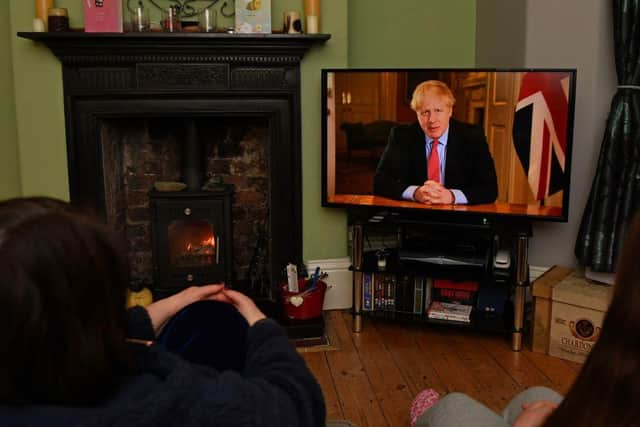What is essential work? Guidance on who should go to work during lockdown in UK amid coronavirus pandemic
Speaking in an address to the public on Monday night Boris Johnson insisted that members of the public stay at home, outlining only a handful of exceptions.
One such exception was that members of the public were still allowed to leave their house to travel to and from work, but only “where this is absolutely necessary and cannot be done from home”.


‘If you are working on site, you can continue to do so’
Advertisement
Hide AdAdvertisement
Hide AdSecretary of State for Housing, Communities & Local Government Robert Jenrick went into more detail on who should and shouldn’t go into work.
He tweeted: “If you can work from home, do so.
“If you are working on site, you can continue to do so. But follow Public Health England guidance on social distancing.”
This suggests, though doesn’t explicitly state, that the likes of construction workers should continue to go to work, but maintain social distance while doing so.
This came after First Minister Nicola Sturgeon encouraged the closure of building sites.
What is essential work?
Last week the government announced the closure of schools to all pupils with the exceptions of children of “key workers”.
These key workers will continue to be allowed to attend work under lockdown rules, though should work from home if possible.
Who is classed as a key worker?
Here is a full list of key workers:
Health and social care
Including doctors, nurses, midwives, paramedics, social workers, care workers, and other frontline health and social care staff required to maintain the UK’s health and social care sector
Education and childcare
This includes nursery and teaching staff, social workers and those specialist education professionals who must remain active during the COVID-19 response to deliver this approach
Key public services
Advertisement
Hide AdAdvertisement
Hide AdWhich includes those essential to the running of the justice system, religious staff, charities and workers delivering key frontline services, and journalists and broadcasters who are providing public service broadcasting
Local and national government
This only includes those administrative occupations which are essential to the effective delivery of the COVID-19 response or delivering essential public services, such as the payment of benefits
Food and other necessary goods
Those involved in food production, processing, distribution, sale and delivery as well as those essential to the provision of other key goods
Public safety and national security
This includes police and support staff, Ministry of Defence civilians, contractor and armed forces personnel, fire and rescue service employees, National Crime Agency staff, those maintaining border security, prison and probation staff and other national security roles
Transport
Those who will keep the air, water, road and rail passenger and freight transport modes operating during the COVID-19 response, including those working on transport systems through which supply chains pass
Utilities, communication and financial services
This includes staff needed for essential financial services provision, the oil, gas, electricity and water sectors, information technology and data infrastructure sector and primary industry supplies to continue during the COVID-19 response, as well as key staff working in the civil nuclear, chemicals, telecommunications, postal services and delivery, payments providers and waste disposal sectors
Work from home if you can
The government have encouraged businesses and workplaces to encourage their employees to work at home, wherever possible.
Simply put, if you can work from home you are now compelled to do so.
Advertisement
Hide AdAdvertisement
Hide AdUnsure if your work is necessary? Stay at home and contact your employer
If it is possible to work from home now employers should actively insist that you do so.
If you have been continuing to work on site, and have not yet been contacted by your employer, you should follow government instruction and stay at home, contacting your employer when possible.
As an employee you are entitled by law to request flexible working which could be used to ask to work from home. Given the serious nature of the government’s instructions most employers should accept your request to work from home if they haven’t already.
Coronavirus: the facts
What is coronavirus?
COVID-19 is a respiratory illness that can affect lungs and airways. It is caused by a virus called coronavirus.
What caused coronavirus?
The outbreak started in Wuhan in China in December 2019 and it is thought that the virus, like others of its kind, has come from animals.
How is it spread?
As this is such a new illness, experts still aren’t sure how it is spread. But, similar viruses are spread in cough droplets. Therefore, covering your nose and mouth when sneezing and coughing, and disposing of used tissues straight away is advised. Viruses like coronavirus cannot live outside the body for very long.
What are the symptoms?
The NHS states that the symptoms are: a dry cough, high temperature and shortness of breath - but these symptoms do not necessarily mean you have the illness. Look out for flu-like symptoms, such as aches and pains, nasal congestion, runny nose and a sore throat. It’s important to remember that some people may become infected but won’t develop any symptoms or feel unwell.
What precautions can be taken?
Advertisement
Hide AdAdvertisement
Hide AdWashing your hands with soap and water thoroughly. The NHS also advises to cover your mouth and nose with a tissue or your sleeve (not your hands) when you cough or sneeze; put used tissues in the bin immediately and try to avoid close contact with people who are unwell. Also avoiding touching eyes, nose and mouth unless your hands are clean.
Government advice
As of Monday 23 March the prime minister has put the UK into lockdown and instructed all citizens to stay at home. People can only leave their homes to exercise once a day, go shopping for food and medication, travel for medical needs or to care for a vulnerable person, and travel to work only if essential. Police will be able to enforce these restrictions.
All non-essential shops will close with immediate effect, as will playgrounds, places of worship and libraries. Large events or gatherings of more than two people cannot go ahead, including weddings and celebrations. Funerals can only be attended by immediate family.
Children of separated parents can go between both parents' homes.
Anyone with a cough or cold symptoms needs to self-isolate with their entire household for 14 days.
The government has now instructed bars, restaurants, theatres and non-essential businesses to close and will review on a ‘month to month’ basis. Schools closed from Friday 20 March for the foreseeable future, and exams have been cancelled.
The over 70s or anyone who is vulnerable or living with an underlying illness are being asked to be extra careful and stay at home to self-isolate. People with serious underlying health conditions will be contacted and strongly advised to undertake "shielding" for 12 weeks.
For more information on government advice, please check their website. https://www.gov.uk/government/topical-events/coronavirus-covid-19-uk-government-response
Should I avoid public places?
Advertisement
Hide AdAdvertisement
Hide AdYou should now avoid public places and any non-essential travel. Travel abroad is also being advised against for the next 30 days at least, and many European countries have closed their borders.
What should I do if I feel unwell?
Don’t go to your GP but instead look online at the coronavirus service that can tell you if you need medical help and what to do next. https://111.nhs.uk/covid-19
Only call 111 if you cannot get help online.
When to call NHS 111
Only call NHS 111 if you can’t get help online and feel very unwell. This should be used if you feel extremely ill with coronavirus symptoms. If you have been in a country with a high risk of coronavirus in the last 14 days or if you have been in close contact with someone with the virus please use the online service.
Sources: World Health Organisation and NHS
